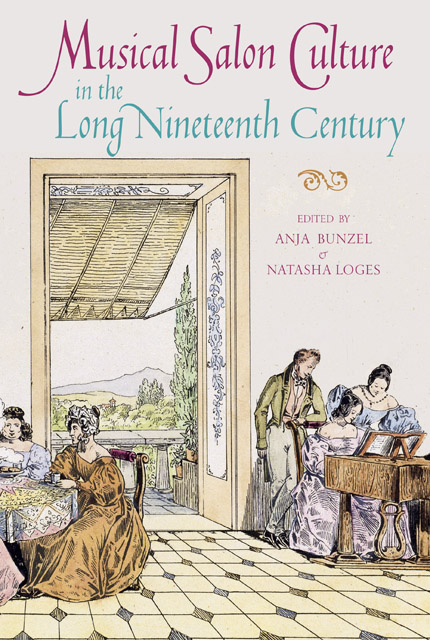1 - Johanna Kinkel’s Social Life in Berlin (1836–39): Reflections on Historiographical Sources
Published online by Cambridge University Press: 17 January 2023
Summary
Perhaps more than other topics, salon scholarship entails the study of diverse and fragmentary sources, primarily individual protagonists’ own accounts of themselves and others, within otherwise poorly documented private circles. It thus invites historiographical reflection, for example, when an author chooses to construct an idealised life through a personal memoir, when recollections or correspondence by other, similarly self-constructing authors choose to privilege differing information, or when sources are downright conflicting. This chapter explores such sources around the composer, music pedagogue and pianist Johanna Kinkel (1810–58), presenting a series of conflicts and quandaries. While Kinkel continues to be unknown to many musicologists today, her image among scholars of gender, music and literature is that of a prolific composer and writer, whose oeuvre is strongly coloured by her own and her husband’s political activities in 1840s Germany. This image stems from her link with Gottfried Kinkel (1815–82), whom she married in 1843. However, Kinkel published a major part of her musical output before that marriage, namely during her years in Berlin (1836–39). Focusing on this period, this chapter offers a perspective on Kinkel as a versatile participant in Berlin salon culture. Both Kinkel’s own autobiographical documents and her early biographer Paul Kaufmann’s accounts suggest that, as a close friend of Felix Mendelssohn and Fanny Hensel, she was right at the top of the Berlin musical scene. I will show that not all of Kinkel’s and Kaufmann’s statements can be verified by way of historical evidence, including the actual number and musical standards of salons she claimed to have attended, and perceptions of her relationship with the Mendelssohns. On the other hand, Kinkel’s contemporaries’ writings reveal that, while she may have idealised her relationship with the Mendelssohns, she concealed contacts with other Berlin protagonists. It is not the aim of this chapter to expose Kinkel as a liar, but rather to offer an insight into Kinkel’s network in Berlin by bringing to light some contradictions revealed by hitherto unconsidered primary materials. It is up to the reader to shape their own image of Kinkel, although, as in any historiographical writing, my own position, namely that of a musicologist with a focus on Kinkel’s compositional activities, might not go unnoticed.
- Type
- Chapter
- Information
- Musical Salon Culture in the Long Nineteenth Century , pp. 13 - 26Publisher: Boydell & BrewerPrint publication year: 2019



